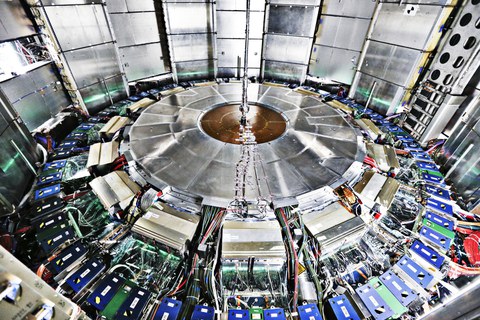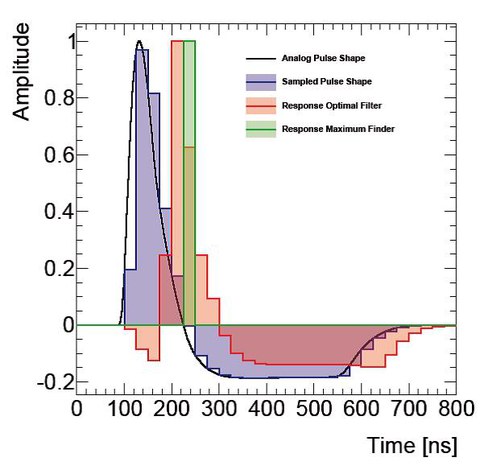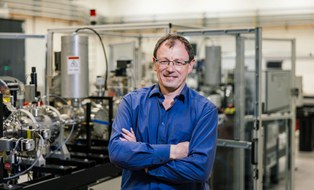Research Phase Master
General Information
The research phase of the Master studies in Physics consists of two parts: the scientific research project and the Master thesis proper. The topics of these parts are closely connected and build apon each other.
Below you find the thesis topics offered by the IKTP. If you are interested in one of the topics, please, contact the relevant group leader.
Particle Physics
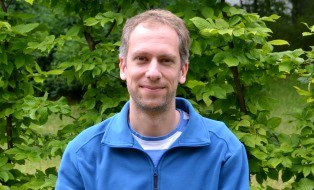 © IKTP
© IKTP
Group Leader
NameProf. Dr. Frank Siegert
Chair of Particle Physics and its Simulation
Send encrypted email via the SecureMail portal (for TUD external users only).
Certificate of DFN-PKI for encrypted email communication.
Institute of Nuclear and Particle Physics
Visiting address:
Andreas-Schubert-Bau, Ground floor, room E17 Zellescher Weg 19
01069 Dresden
Office hours:
By arrangement
- Topics of Bachelor and Master theses can also be found on this page
Topics
The longitudinal polarisation states of the W and Z bosons are generated in the spontaneous breaking of the electroweak symmetry by the Brout-Englert-Higgs field. The polarised production of W and Z boson pairs via vector-boson-scattering processes provides a sensitive test of the electroweak symmetry breaking mechanism. In particular, the couplings of longitudinally polarised W and Z bosons to the Higgs boson prevent the divergence of tree-level amplitudes at high energies. We offer several projects related to the measurement of longitudinal W-Boson scattering, e.g. the simulation of this process with the Sherpa event generator or the estimation of background to this process in data from the ATLAS experiment.
We are planning to use machine learning to aid in our measurement of vector bosons' polarization from the properties of their hadronic decay products, both to differentiate the vector boson jets from other QCD jets and to identify the polarizations. In order to optimize this we would like to compare different strategies and architectures on the machine learning side.
One of our analyses aims to meausure the polarization of vector bosons from the properties of their hadronic decay products. The Monte Carlo simulations used for this study need to assume the vector boson to be on-shell. We would like to investigate the impact of this approximation by producing off-shell simulations in Sherpa and comparing the results to the existing samples.
The discrimination of the signatures of electrons and hadrons with the ATLAS detector relies on the longitudinal and lateral development of the electromagnetic shower, as well as the geometric matching of the electromagnetic shower to a track in the inner detector. The optimal discrimination relies on a precise understanding and modelling of the shower of both the electrons and the hadrons. This project will use generative machine learning techniques to transform variables quantifying the shower development in simulation to those in data. The training relies on event samples in data and simulation that are enriched in background processes.
Measuring Higgs boson pair production is crucial for directly probing the Higgs trilinear coupling, with HH → γγ bb emerging as one of the most sensitive final states at the HL-LHC. Given the rarity of the process, precise background modelling is critical. In particular, Higgs production in association with a bottom–antibottom quark pair constitutes a significant background, as it populates the Higgs-resonant phase space. This project aims to improve the modelling of the Hbb background by developing a variable flavour number scheme in the Sherpa Monte Carlo simulator, enabling a more accurate description of bottom-quark dynamics.
The Future Circular Collider and its potential electron-positron collision running mode provides interesting physics opportunities complementary to a hadron collider like the LHC. This master topic should explore the simulation of heavy-flavour production (c- and b-quarks) using a new method previously applied in hadron collisions.
Our group is renowned for its research into the measurement and theoretical description of the polarisation of gauge bosons. But fermions also have a spin degree of freedom and the decay of taus and tops provides a handle for interesting measurements of it. The idea of this master topic is to explore improvements in its simulation and/or connect to relevant ATLAS measurements in this area.
The simulation program Sherpa can currently only simulate decay cascades with up to 3 final state particles in each step. For decays of the Higgs boson into 4 fermions via WW or ZZ diagrams it becomes important to simulate the full 1->4 decay. This thesis is about implementing such decays and make phenomenological comparisons to existing calculations.
Experimental Particle Physics
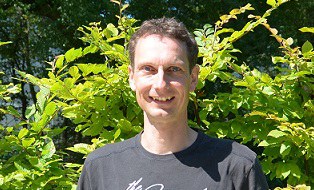 © IKTP
© IKTP
Group leader
NameProf. Dr. Arno Straessner
Experimental particle physics
Send encrypted email via the SecureMail portal (for TUD external users only).
Institute of Nuclear and Particle Physics
Visiting address:
Andreas-Schubert-Bau, 4. OG, Raum 428 Zellescher Weg 19
01069 Dresden
Themenübersicht:
Bachelor Thesis, Research Studies Master, Master Thesis in Experimental Particle Physics
- Multivariate analysis, machine learning and artificial intelligence
- Optimisation of data analyses for particle searches and reconstruction of particle decays
- Application and development of software for statistical data analysis
One of the research activities of the ATLAS group at the Institute of Nuclear and Particle Physics is the search for new Higgs bosons in extensions of the Standard Model at the Large Hadron Collider (LHC). A large data set is available from ATLAS Run-2 and Run-3 with a total luminosity of 200 fb-1, which can be analysed. More data are currently being recorded by ATLAS.
In many scenarios beyond the Standard Model, the decay of the new Higgs bosons is into a pair of tau leptons. We therefore study the hadronic decay of such tau leptons in detail, in particular, to obtain a high significance for the Higgs signal, and a large suppression of backgrounds.
In the data analyses, we exploit advanced statistical methods and very often apply methods of machine learning to optimize the selection algorithms or parameter settings.
The topics of the Bachelor and Master theses will be defined individually according to your interest and to the current state of research.
In the thesis project, you will learn software-based methods of data analysis and statistics, the application of machine learning tools, and the use of modern particle detectors.
You should bring a basic knowledge of particle physics. Programming skills would be an asset, but we will also provide introductory sessions to all necessary programming and analysis tools.
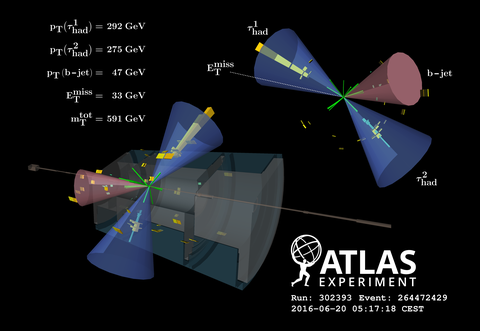
pp collision event recorded by the ATLAS detector at the LHC. The picture shows a candidate of a supersymmetric Higgs boson decay into a pair of tau leptons.
Bachelor Thesis, Research Studies Master, Master Thesis in Experimental Particle Physics
- Machine learning und artificial neural networks
- Optimisation of the energy measurement of photons, electrons and hadronic jets with Liquid-Argon calorimeters
- Programming or simulation of electronic and digital signal processing
- Statistical analysis of measurement data
The Liquid-Argon Calorimeters (LAr Calorimeters) of the ATLAS detector at the LHC are going to be upgraded with new readout electronics for operating at highest LHC luminosities. The calorimeter signals shall be reconstructed with improved energy and spatial resolution so that particles produced in proton-proton collisions can be identified with higher precision. The goal is, for example, an improved detection of Higgs boson decays with the ATLAS detector.
The particle identification and energy reconstruction must be performed in real-time, and the time to provide the energy calculation in each detector cell must not take longer than 0.5 μs. For this reason, we use modern and fast programmable electronic circuits, so-called Field Programmable Gate Arrays (FPGAs) for signal reconstruction. We exploit deep learning methods and artificial intelligence to optimize our measurements.
In the Bachelor or Master thesis, the energy reconstruction of the ATLAS LAr Calorimeters shall be improved using machine learning approaches.
In the research project, you will learn the application of machine learning tools (e.g. keras), software-based data analysis, and the functioning of a modern particle detector and electronic readout systems.
If you are interested you may also learn about programming of FPGAs using the programming language VHDL. You can get involved in the application of machine learning algorithms or on advanced data processing procedures running on FPGA devices.
You should bring a basic knowledge of particle physics, and the motivation to learn more about machine learning and/or FPGA programming. Basic programming skills are an asset. We also provide introductory sessions to VHDL and the analysis tools needed for your work.
Theoretical Particle Physics
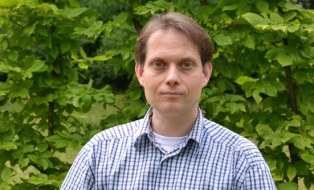 © IKTP
© IKTP
Institute Director, Group leader
NameProf. Dr. Dominik Stöckinger
Theoretical particle physics
Send encrypted email via the SecureMail portal (for TUD external users only).
Institute of Nuclear and Particle Physics
Visiting address:
Andreas-Schubert-Bau, EG, Raum E13 Zellescher Weg 19
01069 Dresden
The research group Theoretical Particle Physics / Phenomenology of Elementary Particles is offering various topics for the scientific research project and the Master thesis. All topics can be found on this Overview document
Experimental Nuclear Physics
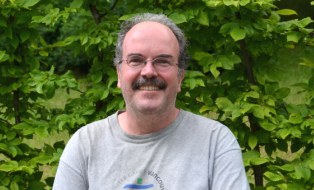 © IKTP
© IKTP
Group leader
NameProf. Dr. Kai Zuber
Nuclear and neutrino physics
Send encrypted email via the SecureMail portal (for TUD external users only).
Institute of Nuclear and Particle Physics
Visiting address:
Andreas-Schubert-Bau, EG, Raum E11 Zellescher Weg 19
01069 Dresden
Thesis topics on neutrino and nuclear physics can be found on this web page.
Thesis topics with work in the research underground lab "Felsenkeller" can be found on this web page.
Radiation Physics at the IKTP
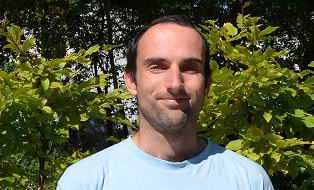 © IKTP
© IKTP
Group leader
NameMr Dr. Thomas Kormoll
Strahlungsphysik
Send encrypted email via the SecureMail portal (for TUD external users only).
Institute of Nuclear and Particle Physics
Visiting address:
Andreas-Schubert-Bau, 4. OG, Raum 406 Zellescher Weg 19
01069 Dresden
- Medizinische Dosimetrie: Entwicklung der Faserdosimetrie als neue Form der Qulitätskontrolle bei therapeutischen Bestrahlungen, insbesondere in Protonenfeldern.
- Kerntechnischer Rückbau: Konzeption und Entwicklung kompakter Sonden für die Radionuklididentifikation in schwer zugänglichen Geometrien (Bohrlöcher, Betonreste aus dem Rückbau etc.).
- Strahlenschutz-Messtechnik: Mitarbeit in der Entwicklung eines handgehaltenen Dosisleistungsmessgeräts für den Strahlenschutz des medizinischen Personals an klinischen Röntgen- und Therapieeinrichtungen.
- Bildgebung: Ausbau eines präklinischen Kleintier-PET-Scanners zu einem Praktikumsversuch am IKTP und Entwicklung eigener Algorithmen zur weiteren Nutzung für die Tomographie in der Entsorgung von radioaktiven Abfällen.
Physics of Particle Beams
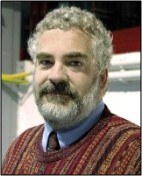
Group leader
NameProf. Dr. Thomas Cowan
Radiation Physics
Institute of Nuclear and Particle Physics
HZDR:
Bautzner Landstraße 400
01328 Dresden
None
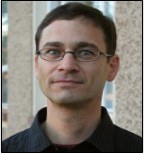
Group leader
NameMr Prof. Dr. Ulrich Schramm
Strahlenphysik
Institute of Nuclear and Particle Physics
HZDR:
Bautzner Landstraße 400
01328 Dresden
None
Die verschiedenen Gruppen des Instituts für Strahlenphysik am HZDR www.hzdr.de/fwk bieten auf dieser Seite Masterarbeiten innerhalb des Helmholtz-Forschungsprogramms "Materie und Technologie" an.
Research Group on Accelerator Mass Spectroscopy and Isotope Research at HZDR
Für die Abteilung Beschleuniger-Massenspektrometrie und Isotopenforschung am HZDR www.hzdr.de/fwir findet man das Forschungsspektrum und die angebotenen Masterarbeiten in dieser Präsentation der Bachelor-Infoveranstaltung vom Januar 2021.

